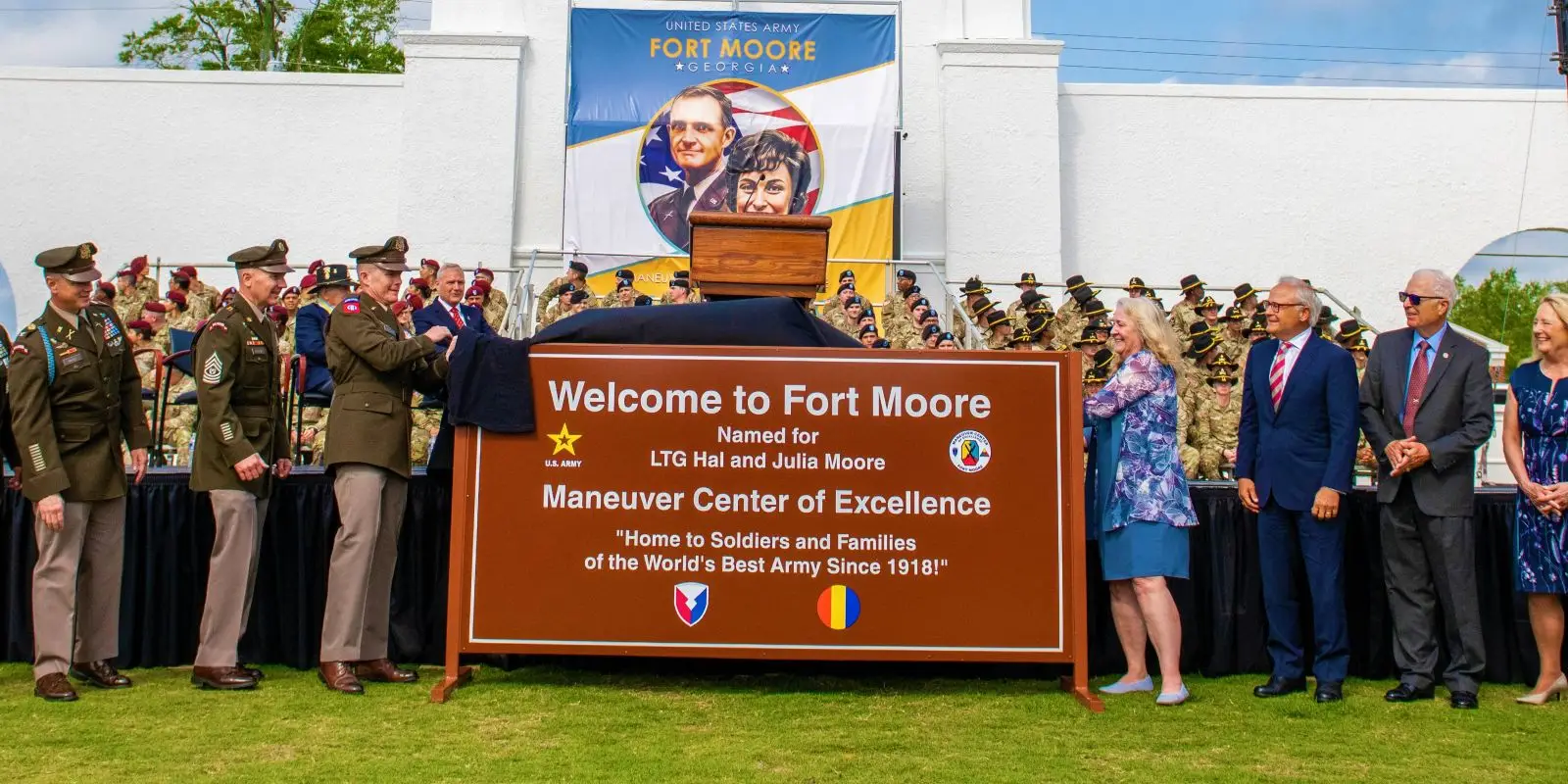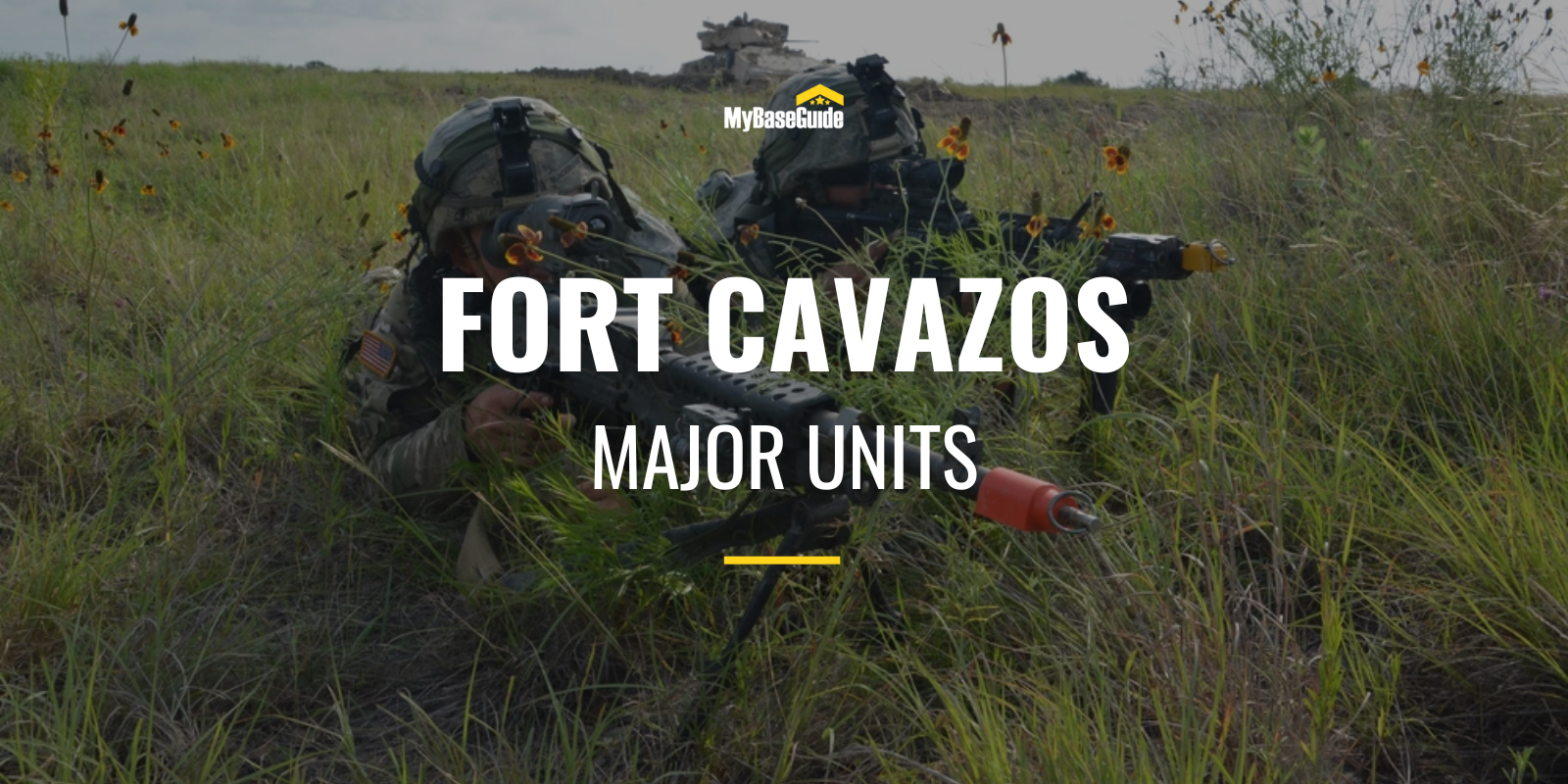FORT BENNING NAME CHANGE IS NOW OFFICIAL

There has been a lot of talk about renaming military bases and now we’re seeing those promises turn into action. Among the latest changes comes the Fort Benning name change in Georgia. While Fort Benning changing its name has been on the docket for quite some time, it’s not official and Fort Moore will be the new namesake of the installation known for developing the skills of elite infantry in the U.S. Army.
Related: FORT LIBERTY: BIG CHANGE FOR THE ARMY’S BIGGEST BASE
Is Fort Benning Being Renamed?
Yes, the Fort Benning name change was made official on May 11, 2023. The new name for Fort Benning is Fort Moore, which will honor the legacy of a military couple that had and continues to have a major influence on the lives of Soldiers and their families.
The military installation formerly known as Fort Benning is known for many reasons, but is the primary place for basic training for the Infantry in the U.S. Army. You’ll also find Cavalry Scouts and Tankers undergoing basic at the installation now known as Fort Moore.
Controversy surrounding Fort Moore’s original name came to be as more and more people called for a renaming of military bases that feature ties to the Confederacy. Used as a marketing tactic around World War I, many bases began bearing the names of those that fought for the South.
But many view this as decisive. Not only because of the ties to slavery and racism but also because the Confederacy was a direct enemy against the Union, which represented the United States of America in the American Civil War.
However, where there are cases to be made for some, the direct evidence against Henry Benning, the previous person to have the honor of the base’s namesake, made it very clear to see where he stood.
A general in the Confederate army, Benning didn’t just literally go to war against the United States, but was blatant in his support for the enslavement of Blacks and played a major role in getting the South to secede:
"What was the reason that induced Georgia to take the step of secession? This reason may be summed up in one single proposition. It was a conviction, a deep conviction on the part of Georgia, that a separation from the North was the only thing that could prevent the abolition of her slavery..If things are allowed to go on as they are, it is certain that slavery is to be abolished…By the time the North shall have attained the power, the Black race will be in a large majority, and then we will have Black governors, Black legislatures, Black juries, Black everything," said Benning.
Conversely, Lt. Gen. Moore worked in a completely different fashion. Known for helping provide equal opportunities in the Army, Moore was responsible for leading men at a time when the force was integrating Black Soldiers.
Suggested read: FORT BARFOOT IS THE FIRST RENAMED ARMY BASE DUE TO CONFEDERACY
Fort Moore Honors an Influential Military Couple
The Moores are one of the couples in Army history that didn’t just serve and support during conflicts in their lifetime, but also set up a better place for Soldiers in the future.
Lt. Gen. Moore, a Veteran of both the Korean and Vietnam Wars, is renowned for leading the 1st Battalion, 7th Cavalry Regiment during the epic Battle of Ia Drang Valley, which marked one of the early significant conflicts of the Vietnam War.
It showcased groundbreaking air assault strategies, such as rapid Soldier deployment and helicopter-based medical evacuations for the wounded.
During the Korean War, Lt. Gen. Moore was a Commander of the 7th Infantry Division. This was during the time in which the U.S. Army was ending segregation and when Moore would create what many believe was the precursor to the force’s equal opportunity policy.
"Early on, it was clear to me that many of the race relations problems and perceptions and real cases of discrimination occurred at the small-unit level. As I checked into that, the other small-unit leadership deficiencies came to light," said Moore in his biography, Hal Moore: A Soldier Once … and Always.
Moore later created courses for Noncommissioned Officers to emphasize the importance of treating Soldiers with dignity and prioritizing their well-being for a successful military. These courses served as a precursor to the Army's Basic Leader Course, a three-week mandatory training for new NCOs that focuses on Army personnel policy.
During the 1970s, Moore was responsible for Army personnel policy and continued to spearhead significant equal opportunity initiatives. This included integrating Soldiers from racial minority groups into officer selection boards, increasing recruitment of Black officers, and implementing race-relations training programs.
Julia Moore's impact can also be seen on multiple levels. Her lobbying led to the establishment of a stronger support system for military families, including the tradition of delivering fatality notifications by a Soldier in dress uniform, accompanied by a Chaplain, which is still practiced today.
She volunteered at the Red Cross, on-base daycare centers, and hospitals while her husband, Lt. Gen. Moore, served. Following her death in 2004, she was buried at Fort Moore cemetery alongside her husband, who passed away in 2017.
Overall, it’s clear that the Fort Benning name change to Fort Moore is going to honor a couple that is more than deserving of the recognition. This accolade helps immortalize a couple that continue to provide support to Soldiers and their families.
Why Are They Changing the Name of Fort Benning?
The Fort Benning name change comes as the Pentagon continues its effort to remove Confederate names from military installations, among other aspects of military life. Fort Moore is among nine Army bases being renamed. Most new names honor service members and their families, except for Fort Bragg, North Carolina, which will become Fort Liberty on June 2, 2023.
Read next: RENAMING MILITARY BASES IN 2023 IS A FOCUS OF NAMING COMMISSION
SHARE:
TAGS:
JOIN OUR NEWSLETTER
Get the latest news and military discounts



